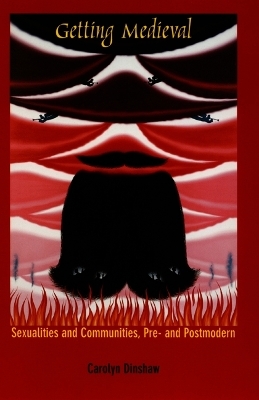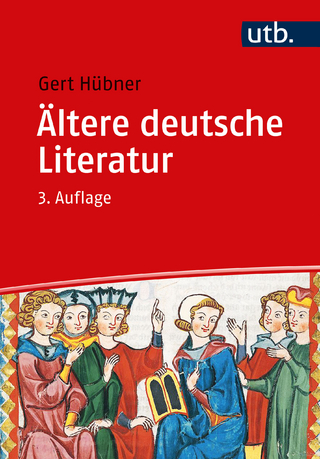
Getting Medieval
Sexualities and Communities, Pre- and Postmodern
Seiten
1999
Duke University Press (Verlag)
978-0-8223-2365-5 (ISBN)
Duke University Press (Verlag)
978-0-8223-2365-5 (ISBN)
Explores how particular sexual practices and identifications were normalized while others were outlawed in medieval England. This work demonstrates how intellectual inquiry into pre-modern societies can contribute invaluably to contemporary issues in cultural studies. It also attempts to make connections between past and present cultures.
In Getting Medieval Carolyn Dinshaw examines communities—dissident and orthodox—in late-fourteenth and early-fifteenth-century England to create a new sense of queer history. Reaching beyond both medieval and queer studies, Dinshaw demonstrates in this challenging work how intellectual inquiry into pre-modern societies can contribute invaluably to current issues in cultural studies. In the process, she makes important connections between past and present cultures that until now have not been realized.
In her pursuit of historical analyses that embrace the heterogeneity and indeterminacy of sex and sexuality, Dinshaw examines canonical Middle English texts such as the Canterbury Tales and The Book of Margery Kempe. She examines polemics around the religious dissidents known as the Lollards as well as accounts of prostitutes in London to address questions of how particular sexual practices and identifications were normalized while others were proscribed. By exploring contemporary (mis)appropriations of medieval tropes in texts ranging from Quentin Tarantino’s Pulp Fiction to recent Congressional debates on U.S. cultural production, Dinshaw demonstrates how such modern media can serve to reinforce constrictive heteronormative values and deny the multifarious nature of history. Finally, she works with and against the theories of Michel Foucault, Homi K. Bhabha, Roland Barthes, and John Boswell to show how deconstructionist impulses as well as historical perspectives can further an understanding of community in both pre- and postmodern societies.
This long-anticipated volume will be indispensible to medieval and queer scholars and will be welcomed by a larger cultural studies audience.
In Getting Medieval Carolyn Dinshaw examines communities—dissident and orthodox—in late-fourteenth and early-fifteenth-century England to create a new sense of queer history. Reaching beyond both medieval and queer studies, Dinshaw demonstrates in this challenging work how intellectual inquiry into pre-modern societies can contribute invaluably to current issues in cultural studies. In the process, she makes important connections between past and present cultures that until now have not been realized.
In her pursuit of historical analyses that embrace the heterogeneity and indeterminacy of sex and sexuality, Dinshaw examines canonical Middle English texts such as the Canterbury Tales and The Book of Margery Kempe. She examines polemics around the religious dissidents known as the Lollards as well as accounts of prostitutes in London to address questions of how particular sexual practices and identifications were normalized while others were proscribed. By exploring contemporary (mis)appropriations of medieval tropes in texts ranging from Quentin Tarantino’s Pulp Fiction to recent Congressional debates on U.S. cultural production, Dinshaw demonstrates how such modern media can serve to reinforce constrictive heteronormative values and deny the multifarious nature of history. Finally, she works with and against the theories of Michel Foucault, Homi K. Bhabha, Roland Barthes, and John Boswell to show how deconstructionist impulses as well as historical perspectives can further an understanding of community in both pre- and postmodern societies.
This long-anticipated volume will be indispensible to medieval and queer scholars and will be welcomed by a larger cultural studies audience.
Carolyn Dinshaw is Professor of English and Director of the Center for the Study of Gender and Sexuality at New York University. She is author of Chaucer’s Sexual Poetics and Chaucer and the Text: Two Views of the Author and cofounding editor of GLQ: A Journal of Lesbian and Gay Studies, also published by Duke University Press.
Acknowledgments xi
Introduction:
Touching the Past 1
Chapter One
It Takes One to Know One: Lollards, Sodomites, and Their Accusers 55
Chapter Two
Good Vibrations: John/Eleanor, Dame Alys, the Pardoner, and Foucault 100
Chapter Three
Margery Kempe Answers Back 143
Coda
Getting Medieval: Pulp Fiction, Foucault, and the Use of the Past 183
Notes 207
Bibliography 305
Index 337
| Reihe/Serie | Series Q |
|---|---|
| Verlagsort | North Carolina |
| Sprache | englisch |
| Maße | 156 x 235 mm |
| Gewicht | 567 g |
| Themenwelt | Geschichte ► Allgemeine Geschichte ► Mittelalter |
| Geschichte ► Teilgebiete der Geschichte ► Kulturgeschichte | |
| ISBN-10 | 0-8223-2365-6 / 0822323656 |
| ISBN-13 | 978-0-8223-2365-5 / 9780822323655 |
| Zustand | Neuware |
| Haben Sie eine Frage zum Produkt? |
Mehr entdecken
aus dem Bereich
aus dem Bereich
eine neue Geschichte des Mittelalters
Buch | Hardcover (2023)
C.H.Beck (Verlag)
38,00 €


